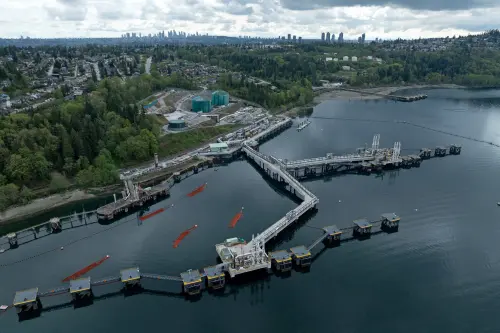In the quest to construct new oil pipelines in Canada, industry experts emphasize the essential role the Canadian government must play to navigate regulatory, financial, and political obstacles, as well as to address activist opposition.
Given threats of tariffs on Canadian oil exports by U.S. President Donald Trump, there have been calls from various Canadian politicians for the construction of new pipelines leading to coastal export terminals, aiming to lessen dependence on the U.S. market.
Canada, as the world's fourth-largest oil exporter, heavily relies on oil as its most valued export commodity, with about 90% of its oil exports directed towards U.S. refiners. Despite calls from government officials for new pipelines spanning west, east, and north coasts, private companies have not shown recent interest in undertaking such multibillion-dollar ventures, citing risks and lengthy timelines.
Challenges in pipeline projects are compounded by canceled initiatives in the past decade, such as the scrapping of two major east-west pipelines and the setback faced when former U.S. President Joe Biden revoked permits for the Keystone XL pipeline project in 2021.
Tariffs on Canadian crude exports could disadvantage U.S. refiners or diminish margins for Canadian producers, potentially diminishing the demand for such pipelines.
Amidst concerns and uncertainties around pipeline construction, the Director of the University of Calgary's School of Public Policy, Kent Fellows, stresses the importance of swift amendments to the Impact Assessment Act to attract private sector investment in new pipeline proposals.
Martha Hall Findlay, also from the University of Calgary, advocates for collaborative efforts between the federal government and provinces, underscoring the need for robust political leadership to navigate complexities in the energy sector.
CEO Greg Ebel of Canadian pipeline operator Enbridge highlights the necessity of substantial policy changes at both federal and provincial levels to reinvigorate investment prospects in Canadian energy infrastructure projects.
Considering Canada's commitment to achieving net-zero greenhouse gas emissions by 2050, alongside projections indicating potential declines in oil output, there is a growing sense of urgency for strategic planning to address long-term energy sustainability and infrastructure needs.
The evolving political landscape and shifting policies emphasize the need for streamlined approaches to large-scale infrastructure projects, with industry analysts cautioning that the timeline for project completion must align with political agendas and cycles.
